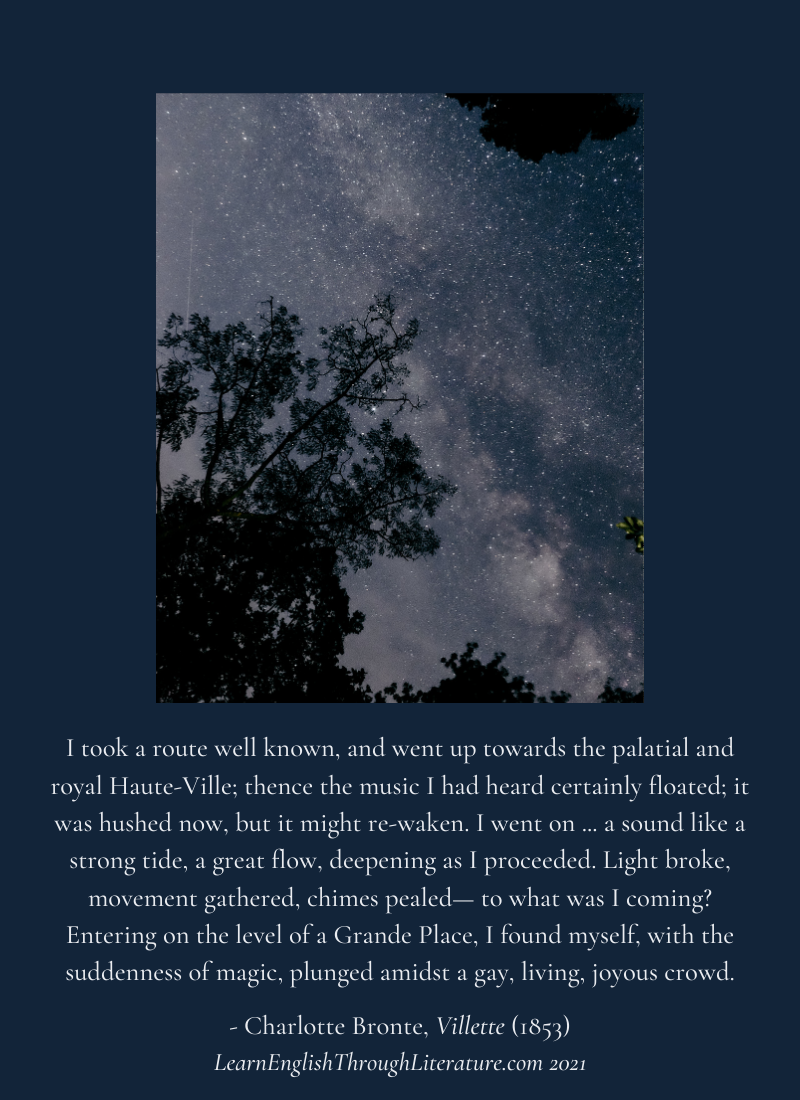In this second part of our Lesson on adjectives, we are going to focus on adjectives ending with -ing in English (for adjectives ending with -ed, check Part 1 of our Lesson).
…
📝 #4 ADJECTIVES ENDING WITH -ing
📘 ‘It seems as if I had been pioneered invisibly, as if some dissolving force had gone before me: for myself, I have scarce made an effort.’
– Charlotte Bronte, Villette (emphasis mine)
Dissolving – this means something that is melting down a (harder surface) into a liquid form.
Dissolving vs dissolved: e.g., ‘her dissolving sadness could be seen in her tears’ vs ‘the dissolved tension gave way to peace and harmony’.
….
📘 ‘Quiet Rue Fossette! I find on this pavement that wanderer-wooing summer night of which I mused; I see its moon over me; I feel its dew in the air.’
– Charlotte Bronte, Villette (emphasis mine)
Wooing – this means to court someone (or something), to encourage them towards falling in love. However, this word of Bronte’s – wanderer-wooing – is a compound word (one made of two words) that she invented. It is an adjective to describe the summer night that (I think) means something like ‘the easygoing, inviting summer night’. But for the purpose of our Lesson, we are going to focus on the second part of it, ‘wooing’, here.
Wooing vs wooed: e.g,. ‘the wooing birds’ (they were making noises as if they were actively wooing someone) vs ‘the wooed bride’ (the bride had already been wooed).
…
📘 ‘I went on: neither band nor bell music came to meet me; another sound replaced it, a sound like a strong tide, a great flow, deepening as I proceeded.’
– Charlotte Bronte, Villette (emphasis mine)
Deepening – this means growing or becoming deeper.
Deepening vs deepened: e.g., ‘the deepening darkness’ or ‘deepening joy’ vs ‘the deepened sorrow of losing two loved ones’.
…
📘 ‘Entering on the level of a Grande Place, I found myself, with the suddenness of magic, plunged amidst a gay, living, joyous crowd.’
– Charlotte Bronte, Villette (emphasis mine)
Living – some synonyms of it include active, vivacious, animated, lively.
Living vs lived: e.g., ‘the living water’ (meaning the ‘life-giving water’ or the ‘water that is alive’) vs ‘her lived experiences abroad’ (meaning ‘the experiences she has already had while living abroad’).
…
📘 ‘Lo! the iron gateway, between the stone columns, was spanned by a flaming arch built of massed stars; and, following them cautiously beneath that arch, where were they, and where was I?’
– Charlotte Bronte, Villette (emphasis mine)
Flaming – actively burning or showing some kind of a flame.
✍️ NOTE: We usually prefer to add a prefix en- to this kind of adjective, so that it becomes ‘enflaming’ or ‘enflamed’ (for more on this prefix, see Part 1 of this Lesson).
Enflaming vs enflamed: e.g., ‘enflaming anger’ (active sense, dangerous, external anger) vs ‘enflamed feelings’ (more passive sense of having experienced these feelings internally and already).
…
📘 ‘This man, in his courtesy, seemed to find nothing strange in my being here alone; only a reason for extending to me, as far as he could, a retiring, yet efficient attention.’
– Charlotte Bronte, Villette (emphasis mine)
This is an excellent adjective to end with, since ‘retiring’ is a fairly common word in English often used to describe someone who is shy and uncomfortable in social situations (they tend to retire from being the centre of attention).
⚠️ It is also important to note with these two adjectives – retiring and retired – that over time they have developed quite distinct meanings – so don’t mix them up! ‘Retired’ usually means someone who has worked all their life but is now no longer working (because of age, illness, or infirmity).
Retiring vs retired: e.g., ‘the retiring boy was too shy to speak in the group’ vs. ‘the retired couple were volunteering at a local charity’.
…
This brings us to the end of yet another ‘mini-Lesson Monday’ lesson, where I try to cover an important grammatical point in greater detail. I hope it has been helpful, and as always, if you have any particular question on this Lesson, I will be more than happy to help.




